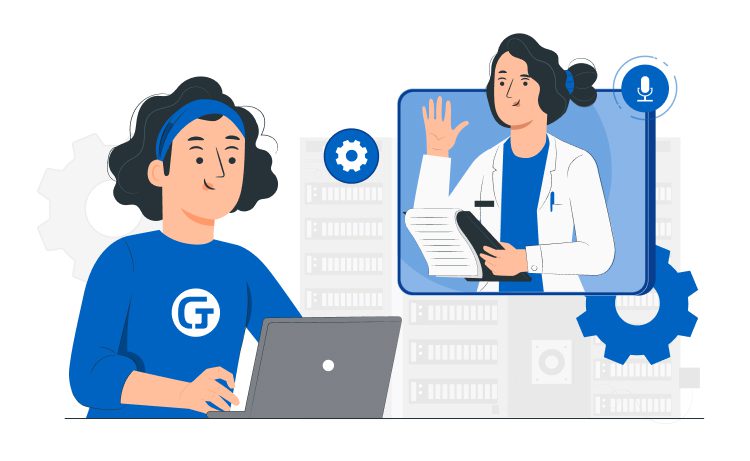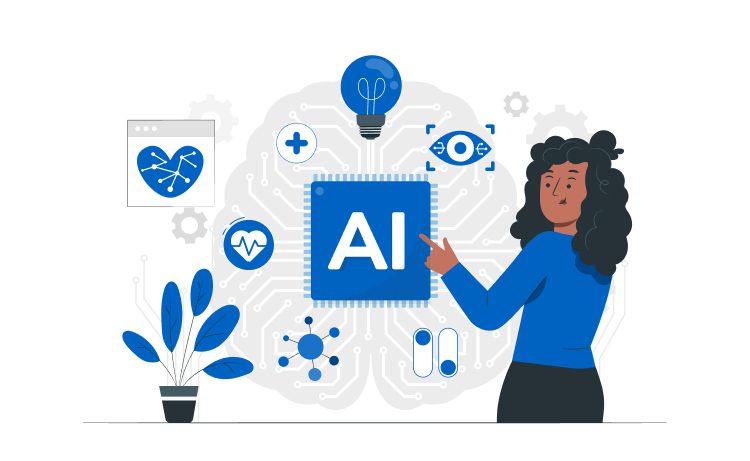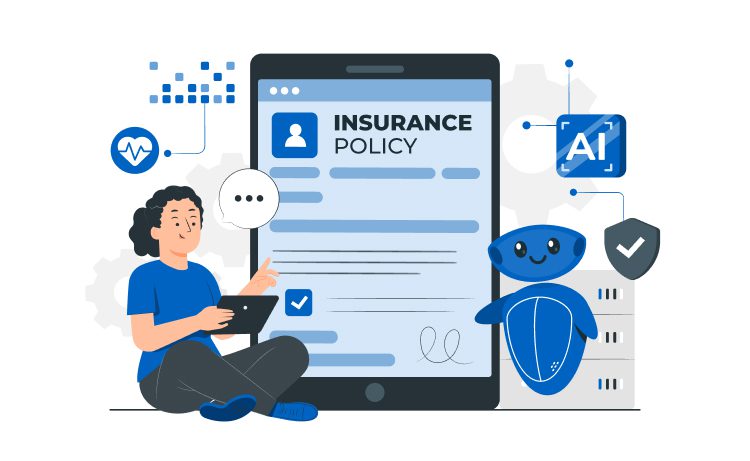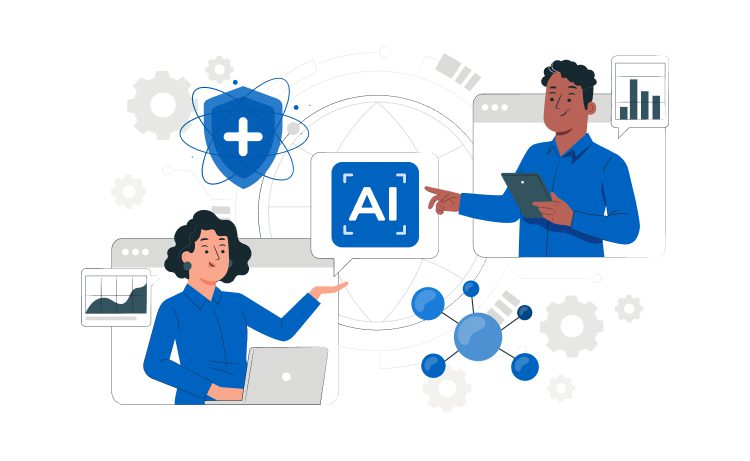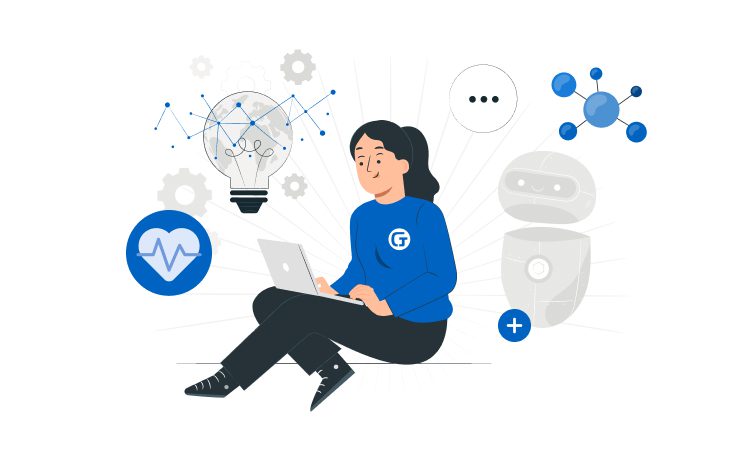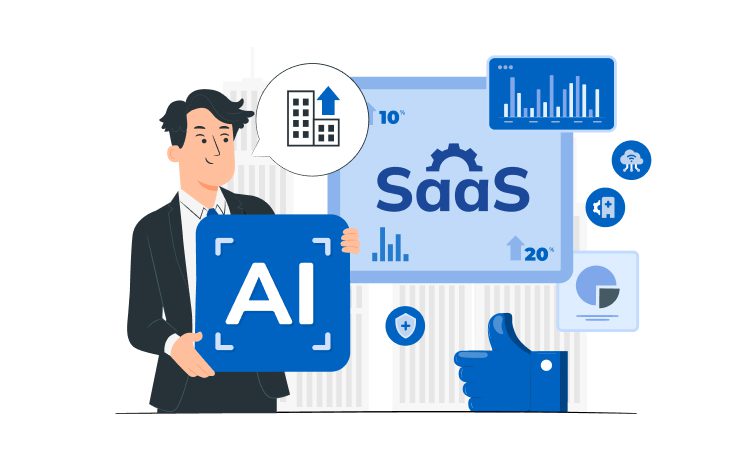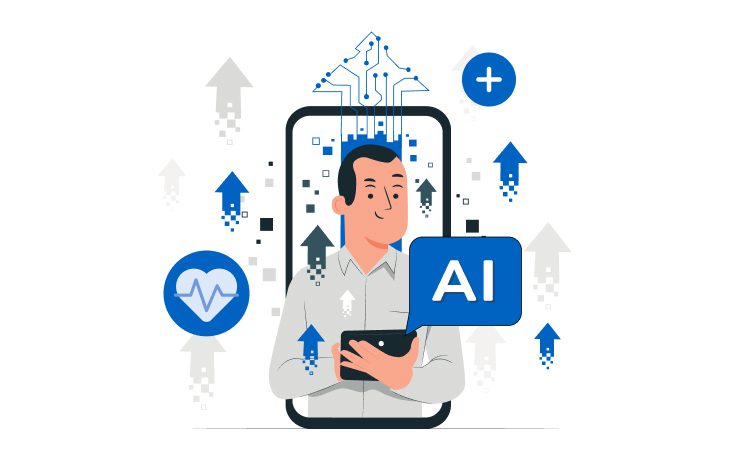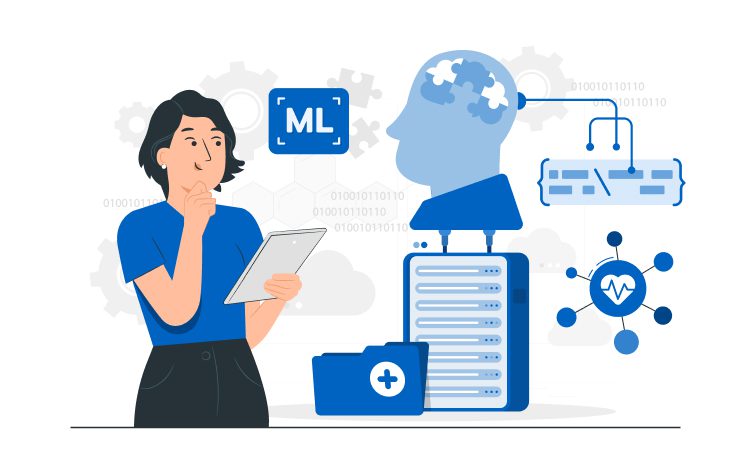
Decoding Deep Learning in Healthcare



Ever tried explaining deep learning in medicine and faced puzzled expressions? You’re not alone. In a world brimming with tech jargon, deciphering what deep learning means for healthcare can be a perplexing journey.
Deep learning is an advanced subset of machine learning that revolves around the training of artificial neural networks. These networks, modeled after the interconnected structure of the human brain, consist of multiple layers of nodes, or neurons. The complexity arises from the ability of these neural networks to iteratively learn and identify intricate patterns within data.
The healthcare industry is rapidly adopting deep learning, with the global market for cognitive and AI systems predicted to reach more than $98 billion by 2024, driven by the technology’s potential to transform multiple industries.
Technically speaking, deep learning involves the utilization of algorithms known as neural networks with multiple hidden layers. These layers enable the system to automatically extract hierarchical features from the input data, progressively refining its understanding through each layer. The process is characterized by the optimization of weights and biases in the network, enhancing its ability to recognize nuanced relationships and patterns.
In practical terms, it’s comparable to providing a computer with extensive datasets and allowing it to autonomously discern features and correlations. For instance, imagine a computer learning to differentiate between cats and dogs by processing a vast array of cat and dog images. This process, while not magical, unfolds through the intricate workings of algorithms and neural network configurations, resulting in a system capable of sophisticated pattern recognition and data interpretation.
Content
In the realm of healthcare, deep learning technology serves as a formidable data specialist, efficiently managing extensive patient information. Its unique capability lies not only in overseeing data but in uncovering concealed insights that traditional methods might miss. This proficiency is not just remarkable; it is essential for accurate diagnostics and the formulation of personalized treatment strategies.
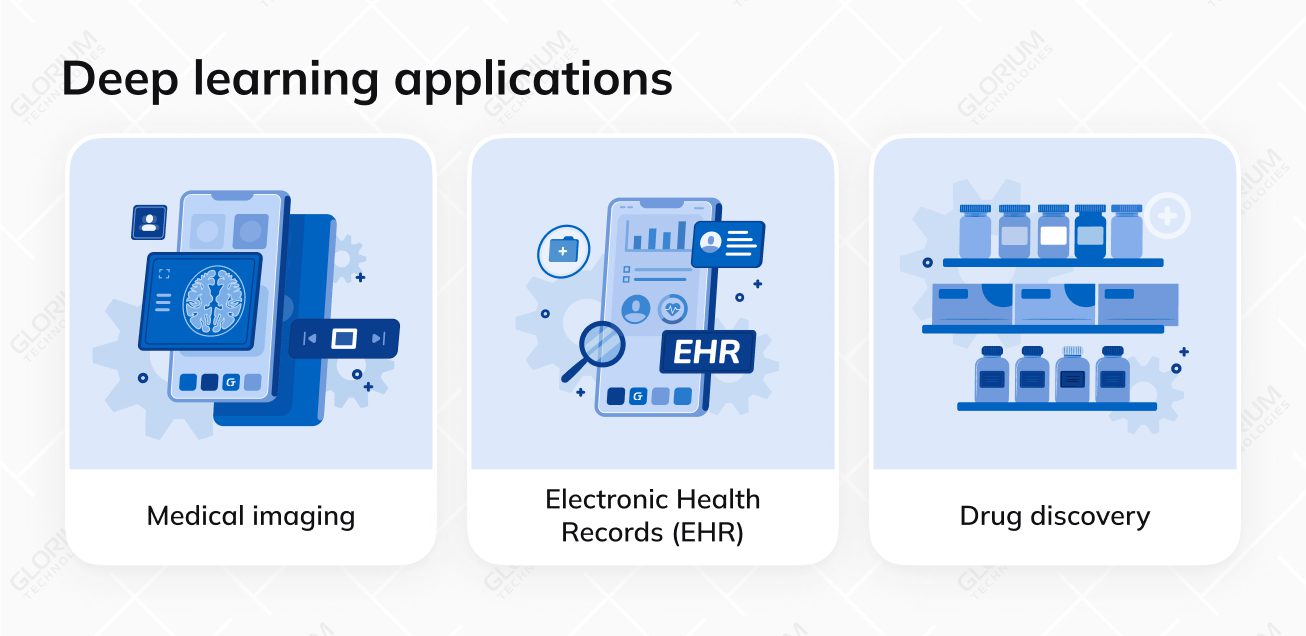
Deep learning has ushered in a transformative era in medical imaging, revolutionizing the way healthcare professionals interpret and diagnose conditions.
Supercharged anomaly detection
Deep learning algorithms are instrumental in analyzing X-rays, swiftly identifying early signs of tumors for immediate intervention and personalized treatment plans.
Faster diagnosis
In busy emergency rooms, deep learning algorithms rapidly process diagnostic images, contributing to faster and more accurate diagnoses.
Personalized treatment mastery
Deep learning decodes a patient’s MRI data, revealing subtle patterns for personalized treatment plans aligned with individual health nuances.
Electronic Health Records (EHRs) represent a crucial paradigm shift in healthcare, and the integration of deep learning has propelled their capabilities to new heights.
Proactive predictive analytics
Deep learning algorithms analyze vast EHR datasets, predicting patient outcomes and enabling proactive management of chronic conditions.
Pinpointing health risks
An EHR system powered by deep learning precisely identifies potential health risks, offering early warnings and facilitating targeted interventions.
Streamlined data management
Deep learning enhances EHR efficiency, automating data interpretation and ensuring seamless interoperability.
In the context of drug discovery, deep learning stands as a catalyst for innovation, reshaping the landscape of pharmaceutical research.
Rapid drug candidate identification
Deep learning expedites the identification of potential drug candidates by swiftly analyzing molecular structures.
Novel compound exploration
In a research lab, deep learning algorithms sift through vast datasets to identify novel compounds with therapeutic promise.
Efficient drug development
The synergy of deep learning and molecular science reduces timeframes and costs associated with bringing new drugs to market.
In the process of integrating deep learning into healthcare, addressing significant challenges is crucial. A primary focus revolves around finding a delicate balance between deriving insights from valuable data and safeguarding individual privacy. This task involves navigating through intricate landscapes, necessitating a thoughtful approach that combines technological innovation, ethical considerations, and legal safeguards.
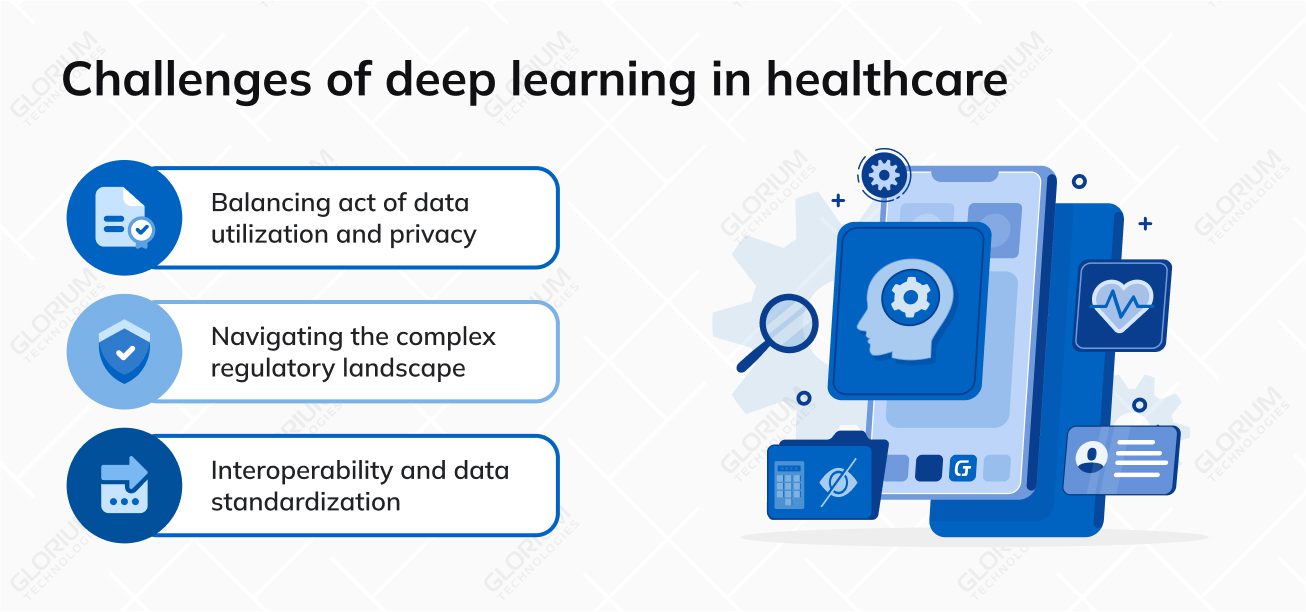
One of the key challenges lies in managing the delicate equilibrium between deriving meaningful insights from healthcare data and safeguarding the privacy of individuals. Implementing robust encryption protocols and access controls is paramount, ensuring that sensitive patient information remains secure.
Compliance with stringent data protection regulations like HIPAA in the US and GDPR in Europe becomes imperative to build trust and uphold the ethical standards of healthcare data management. We have a great article on meeting AI challenges in healthcare on our blog—it’s highly recommended.
Deep learning applications in healthcare must navigate a complex regulatory landscape, adding an additional layer of challenge. Establishing a dedicated regulatory compliance team becomes imperative to ensure that deep learning solutions align with established healthcare guidelines and legal frameworks.
This approach not only mitigates potential risks but also fosters a culture of accountability and transparency. For instance, adherence to regulations such as the FDA’s Pre-Certification Program for Software as a Medical Device (SaMD) demonstrates a commitment to regulatory compliance and patient safety.
Unlocking the full benefits of deep learning in healthcare means tackling a key challenge: making different healthcare systems and devices talk to each other smoothly. This involves creating standardized formats for sharing data, so information can flow seamlessly. To make this happen, collaboration with industry partners is essential.
Working together to set and stick to universal data standards creates an environment where all sorts of healthcare organizations can easily share information. Take, for example, the Fast Healthcare Interoperability Resources (FHIR). This standard has been developed and widely adopted, making it much easier for electronic health information to be shared, promoting a healthcare system that’s more connected and efficient.
To illustrate the practical impact of deep learning, let’s look at 5 popular web and mobile applications that integrate this technology:
Ada Health is a mobile application that employs deep learning to provide personalized health assessments. Users can input symptoms, and the app utilizes a sophisticated algorithm to analyze the data, offering insights into potential health conditions and recommendations for further actions.
PathAI is a web-based platform that utilizes deep learning to enhance pathology services. The application assists pathologists in diagnosing diseases more accurately by analyzing pathology slides and providing valuable insights, ultimately leading to improved patient outcomes.
Buoy Health is an AI-driven chatbot application that employs deep learning to engage users in a conversation about their symptoms. By asking relevant questions, the app narrows down potential health issues and offers guidance on whether medical attention is necessary.
Zebra is a web-based platform that focuses on medical imaging analysis. It uses deep learning algorithms to analyze imaging data, aiding in the early detection of diseases such as cardiovascular conditions and liver diseases.
Tempus is a comprehensive healthcare platform that leverages deep learning for clinical and molecular data analysis. The application assists healthcare providers in making data-driven decisions for personalized patient care and contributes to advancements in cancer research.
As we gaze into the future of healthcare, the role of deep learning in shaping the medical landscape holds promising prospects. A focal point in this trajectory is the ascendancy of personalized medicine, where deep learning emerges as a transformative force in tailoring treatments to the unique profiles of individual patients.
In the realm of real-time diagnostics, imagine a scenario where a patient undergoing an MRI receives instant, highly accurate results through deep learning algorithms. The system swiftly identifies subtle anomalies, allowing healthcare providers to intervene promptly and design personalized treatment plans. For instance, an oncologist can receive immediate insights into tumor characteristics, enabling faster decisions on the most effective course of action for cancer treatment.
Consider a healthcare facility leveraging deep learning integrated with blockchain technology. This integration ensures secure and transparent management of patient records, protecting sensitive health data while allowing authorized stakeholders seamless access.
Additionally, in the context of the Internet of Things (IoT), wearable devices equipped with deep learning capabilities could continuously monitor a patient’s vital signs, providing real-time data for early detection of health issues. These examples showcase how the integration of deep learning with emerging technologies enhances both data security and the efficiency of healthcare delivery.
In this transformative landscape, the role of Software as a Service (SaaS) B2B startups becomes pivotal, as they harness the power of deep learning to offer innovative solutions for healthcare providers. These solutions not only contribute to the advancement of medical diagnostics and treatments but also facilitate the integration of deep learning into the broader healthcare infrastructure, shaping a future where personalized and data-driven healthcare becomes the norm. Make sure to check our blog article on the potential of AI in healthcare for more insights into the future of medicine.
Deep learning in healthcare, an advanced subset of machine learning, harnesses artificial neural networks to decipher intricate patterns within data. Its impact is profound, revolutionizing medical imaging, enhancing electronic health records (EHRs), expediting drug discovery, and ushering in a future of real-time diagnostics and seamless integration with emerging technologies.
However, the journey is not without challenges, from safeguarding patient privacy to navigating regulatory landscapes and ensuring interoperability. The future holds promise, with personalized medicine at the forefront and SaaS B2B startups playing a pivotal role in shaping a healthcare landscape driven by deep learning innovations.

